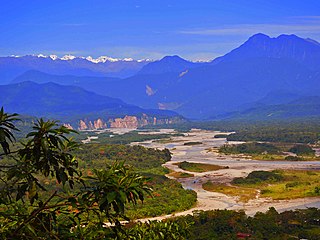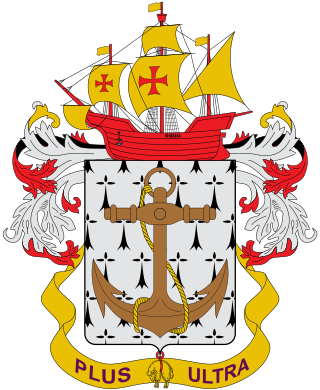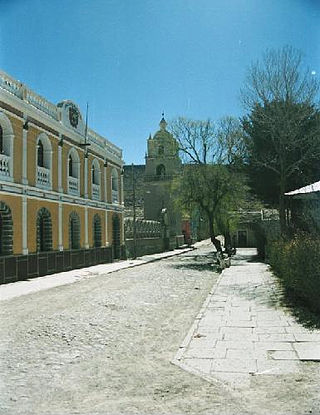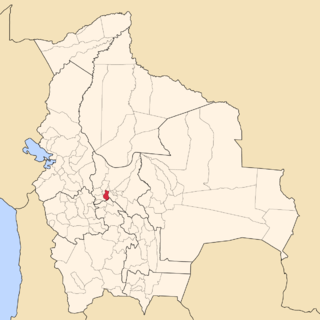
Oruro or Uru Uru is a city in Bolivia with a population of 264,683, about halfway between La Paz and Sucre in the Altiplano, approximately 3,709 meters (12,169 ft) above sea level.

Cochabamba, from Quechua qucha or qhucha, meaning "lake", pampa meaning "plain", is one of the nine departments of Bolivia. It is known to be the "granary" of the country because of its variety of agricultural products from its geographical position. It has an area of 55,631 km2. Its population in the 2024 census was 2,005,373. Its capital is the city of Cochabamba, known as the "City of Eternal Spring" and "The Garden City" because of its spring-like temperatures all year.

Oruro is a department of Bolivia, with an area of 53,588 km2 (20,690 sq mi). Its capital is the city of Oruro. According to the 2012 census, the Oruro department had a population of 494,178.

Tapacarí is a province in the Cochabamba Department, Bolivia. Its capital is Tapacarí. The province is located at a turnoff from the major highway that links Cochabamba and Oruro. It has traditionally been amongst the poorest in the department. Tapacarí Province and neighboring Arque Province are the two poorest of the 16 provinces that make up the department of Cochabamba.

Aroma is one of the twenty provinces of the Bolivian La Paz Department. It is situated in the southern parts of the department. Its seat is Sica Sica.

Daniel Campos is a province in the north-western parts of the Bolivian Potosí Department. It is named after the poet Daniel Campos who originated from this area. The capital of the province is Llica.

Tomás Barrón is a province in the northern parts of the Bolivian department of Oruro.
The Technical University of Oruro, or UTO, is one of ten public universities in Bolivia. It is located in the city of Oruro.

The Colombian Navy, officially the Colombian National Navy, also known as the "Armada Nacional" or just the "Armada" in Spanish, is the naval branch of the military forces of Colombia. The Navy is responsible for security and defence in the Colombian zones of both the Atlantic (Caribbean) and Pacific oceans, the extensive network of rivers inside the country, and a few small land areas under its direct jurisdiction.

Salinas de Garci Mendoza is a town in the Bolivian Oruro Department. It is the administrative center of Ladislao Cabrera Province and is located 280 km (170 mi) south-west of Oruro, the capital of the department. It is situated at an elevation of 3,732 m (12,244 ft) at Caricha, 20 km north of the Tunupa stratovolcano. Salar de Coipasa,a salt lake, is 20 km north-west of Salinas de Garci Mendoza, and 15 km in south-eastern direction is Salar de Uyuni, the world's largest salt pan. Salinas de Garci Mendoza is the endpoint of the road from Chuquichamba via Andamarca and Aroma to Salinas de Garci Mendoza.

The Diablada, also known as the Danza de los Diablos, is an Andean folk dance performed in Bolivia, in the Altiplano region of South America, characterized by performers wearing masks and costumes representing the devil and other characters from pre-Columbian theology and mythology. combined with Spanish and Christian elements added during the colonial era. Many scholars have concluded that the dance is descended from the Llama llama dance in honor of the Uru god Tiw, and the Aymaran ritual to the demon Anchanchu, both originating in pre-Columbian Bolivia

Palacio de Sal is a hotel built of salt blocks. It is located at the edge of Salar de Uyuni, the world's largest salt flat, 350 km south of the La Paz department's capital La Paz.

Santiváñez Municipality is the second municipal section of the Capinota Province in the Cochabamba Department, Bolivia. Its seat is Santiváñez.
Santiago de Andamarca is a small location in Bolivia in the Oruro Department, Sud Carangas Province. It is the seat of the Santiago de Andamarca Municipality. In 2010 the village had an estimated population of 374.
Caracollo, Q'araqullu or Q'ara Qullu is a small town in Bolivia. It is situated in the Cercado Province of the Oruro Department. In 2010 it had an estimated population of 5,429. Located at the place where the highway from La Paz splits into two roads towards Cochabamba and Oruro, the town is a frequent starting point for long marches intended to influence the Bolivian government.
Toledo (Oruro) is a small town in Bolivia. Toledo is the administrative seat of Saucarí Province, as well as that of Toledo Municipality. The town lies at an elevation of 3,715 metres (12,188 ft) between Río Laq'a Jawira in the west and Río Vinto Jahuira in the east, both of which drain into Lake Poopó.

Bolivians are people identified with the country of Bolivia. This connection may be residential, legal, historical or cultural. For most Bolivians, several of these connections exist and are collectively the source of their being Bolivian.
Paria, Bolivia was an important administrative center of the Inca Empire in the late 15th and 16th centuries CE and was the first Spanish settlement in Bolivia, founded in 1535. The ruins of "Old Paria" are located 2 kilometres (1.2 mi) east of the present day hamlet of Paria, which had a population of 106 people in 2012. Paria is 27 kilometres (17 mi) northeast of the city of Oruro. It is situated in a cultivated valley at an altitude of 3,767 metres (12,359 ft).

Franz Gróver Choque Ulloa is a Bolivian industrial engineer, lawyer, and politician who served as vice minister of employment, civil service, and cooperatives from 2019 to 2020. A member of the Social Democratic Movement, he previously served as a party-list member of the Chamber of Deputies from Oruro from 2010 to 2014 on behalf of the National Convergence alliance and as a member of the Constituent Assembly from Oruro, representing circumscription 32 from 2006 to 2007 on behalf of the Social Democratic Power alliance.

Otilia Choque Véliz is a Bolivian community organizer and politician who served as a party-list member of the Chamber of Deputies from Oruro from 2015 to 2020.














